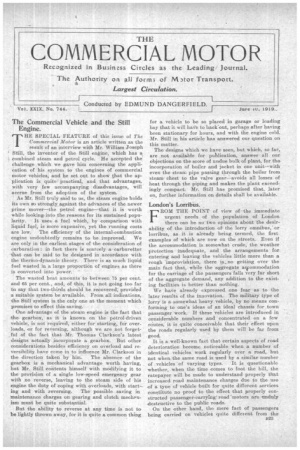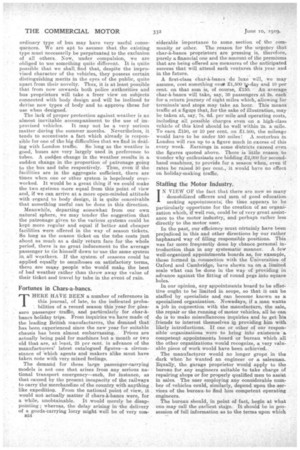London's Lorribiis. .
Page 1

Page 2

If you've noticed an error in this article please click here to report it so we can fix it.
FROM THE POINT of view of-the immediate urgent needs of the population of London there can be no two opinions about the desirability of the introduction of• the lorry omnibus,' or lorribus, as it is already being termed, the first examples of which are now on the streets. Even if the accommodation is somewhat crude, the weather protection inadequate, and the arrangements for. entering and leaving the vehicles little more than a rough improvisation, there is_no getting over the main fact that, while the aggregate aceommodation for the carriage of the passengers falls very far short of the aggregate demand, any addition to the existing facilities is better than nothing.
We have already expressed one fear as to the later results of the innovation. The military type of lorry is a somewhat heavy, vehicle, by no means conforming to one's ideas of an ideal chassis for town passenger work. If these vehicles are introduced in considerable numbers and concentrated on a few isMites, it is quite conceiva,ble that their effect upon the roads regularly used by them will be far from good.
It is a well-known fact that certain aspects of road deterioration become noticeable when a number of identical vehicles work regularly over a road, but not when the same road is used by a similar number of vehicles of varying types. It is questionable whether, when the time comes to foot the bill, the ratepayer will be made to understand properly that increased road maintenance charges due to the use of a tine of vehicle built for quite different services
constitute no proof to the effect that properly constructed passenger-carrying ' road . motors are unduly destructive to the public -roads.
On the other hand, the mere fact of passengers being carried on vehicles quite diffe/ent from the ordinary type of bus may have very useful consequences. We are apt to assume that the existing type must necessarily be perpetuated to the exclusion of all others. Now, under compulsion, we are obliged to use something quite different. It is quite possible that we shall, find that, despite the improvised character of the vehicles, they possess certain distinguishing merits in the eyes of the public, quite apart from their novelty. Thus, it is at least possible that from now onwards both police authorities and bus proprietors will take a freer view on subjects connected with body design and will be inclined to devise new types of body and to approve these for use when designed.
The lack of proper protection against weather is an almost inevitable accompaniment to the use of im provised vehicles. It may not be a very serious matter during the summer months. Nevertheless, it tends to accentuate a fact which already is responsible for one of the big difficulties that we find in dealing with London traffic. So long as the weather is goad, buses are very largely used in preference to tubes. A sudden change in the weather results in a sudden change in the proportion of patronage going to the bus and tube respectively. Thus, even if the facilities are in the aggregate sufficient, there are times when one or other system is hopelessly overworked. It would be a great thing if we could make the two systems more equal from this point of view and, if we can arrive at a more open-minded attitude with -regard to body design, it is quite conceivable that something useful can be done in this direction.
Meanwhile, departing someWhat from our own natural sphere, we may tender the suggestion that the patronage given to the various systems could be kept more regular and equal if better and cheaper facilities were offered in the way of season tickets. So long as the season ticket on the tube costs just about as much as a daily return fare for the whole period, there is no great inducement to the average passenger to tie himself down to. use the same system in. all weather; If the system of seasons could be applied equally to omnibuses on satisfactory terms, there are many people who would make the best of bad weather rather than throw away the value of their ticket and travel by tube in the event of rain.
























